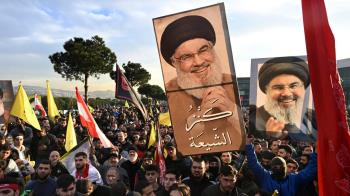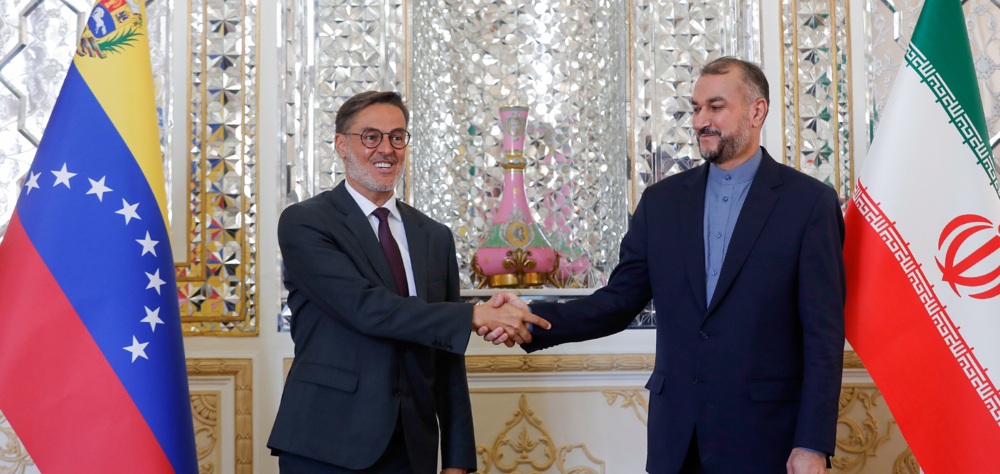Alwaght- Venezuelan Foreign Minister Felix Plasencia visited Iran on Monday heading a political delegation and met President Sayyed Ibrahim Raeisi, Parliament Speaker Mohamad Baqer Ghalibaf, counterpart Hussein Amir-Abdullahian, and Vice President for Economic Affairs Mohsen Rezaee.
The visit comes at a time when the foreign ministers of Iran and Venezuela had previously met on the sidelines of the UN General Assembly in New York. Also, in early October Amir-Abdollahian discussed with his Venezuelan counterpart the latest state of bilateral relations and cooperation.
This is the first visit of a high-ranking Venezuelan diplomat since Raeisi took the office on August 5. So, it needs to be brought to spotlight as an important case.
Positive signals to deepen bilateral ties
The visit to Tehran of the Venezuelan FM sends a positive signal about the need for the two countries to bolster their relations. Plasencia stressed that the country is diligently and obsessively pursuing bilateral relations with Iran, and that ties between the two countries over the past few years have shown that geographical distance cannot hinder cooperation between independent countries.
Amir-Abdullahi asserted that Iran has no limits to expanding relations with Venezuela, stressing that the two countries will continue their joint efforts to defeat the “cruel” US sanctions. These remarks clearly show that Tehran and Caracas are seeking to deepen their political partnership after the new Iranian government took office. The significant point is that just unlike Hassan Rouhani, the new Iranian president is zealous to expand ties with Caracas.
The Iranian-Venezuelan strategic relations were initiated by President Mahmoud Ahmadinejad administration which was in power from 2005-2013. At the time, over 300 agreements were inked with the government of the then President Hugo Chavez. When Rouhani took office in Iran in 2014, relations saw a downturn, though in the last years of Rouhani the two countries engaged in considerable cooperation to jointly fight the US sanctions. Now the new administration in Iran is interested to enhance ties with Venezuela as one of its foreign policy focuses.
Cooperating to battle sanctions and overbearing US policy
Iran and Venezuela have been subject to the heaviest sanctions from the US over the past two decades, and this has led the two countries to a kind of convergence and cooperation in countering Washington's arrogant policies. Over the past years, Iran and Venezuela have taken constructive initiatives to confront Washington by deepening their relations to counter the embargo. The successful delivery of oil by five Iranian tankers to Venezuela and Caracas's diplomatic support for Iran's nuclear program are example of their cooperation. Former Venezuelan Foreign Minister Jorge Arreaza called Iran the “teacher for circumventing the sanctions.”
In the past two decades, the Islamic Republic has seriously pursued a policy of influence and proximity to Latin American countries. At the same time, counter-hegemony and opposition to arrogant US demands on the world stage have been the main linking ring between Tehran and Latin American countries, often close to Tehran in the face of US pressure and their views on the international order. Meanwhile, Venezuela is the most important anti-American player in the South American region which in addition to cooperating with Iran at various levels has had full cooperation with Tehran in opposition to Washington.
In the current situation, the proximity and convergence between Tehran and Caracas is one of the serious concerns of the US government. The White House politicians and strategists are deeply concerned about Iran's influence in the Latin American region and fear that cooperation between the two sides will cover military and security areas. More remarkably, Iran's growing influence in US backyard comes as American military is being forced out of West Asia and North Africa, signaling the complete failure of Washington's policies toward Iran. In general, the new Iranian government intends to further strengthen its ties with Caracas in the face of sanctions and opposition to the White House's hegemonic policies.
Increasing expansion of economic, tourism, and cultural cooperation
Yet another reason the Venezuelan FM visited Iran is expansion of economic partnership between the aligned states, something necessitated by their global cooperation. Over the past years, especially under Ahmadinejad the two nations started substantial economic cooperation. Iran invested around $15 billion in Venezuela during those years.
Over the past years, Venezuela has had difficulty providing fuel for home market despite enjoying huge oil reserves. Iran helped it battle the fuel crisis and bring back economic and political stability by supplying it with fuel. In October 2020, Tehran shipped 800,000 barrels of gasoline to the fuel-strapped country.
In the new conditions, Iran can be active in food and health goods exports to Venezuela. Presently, while the shelves of Venezuelan stores and supermarkets are empty, the Iranian supermarket in Caracas is full of goods, and this has, to an extent, satisfied the citizens of the country. In addition, over the past few years, Tehran has provided significant assistance to Venezuela in rebuilding and repairing its dilapidated oil refineries. Overall, governments of President Raisi and President Nicolas Maduro have the significant background and experience of their predecessors to take advantage of for boosting economic and trade partnership.
Another area of their cooperation is tourism. Iran and Venezuela are two globally recognized tourism destinations, as they enjoy rich cultures and historical heritage. In late 2020, Venezuela Tourism and Foreign Trade Minister Ali Padron visited Tehran. The visit was seen as signaling the two sides’ seriousness to boost ties in this area. Foreign ministries of the two countries look quite ready to follow the agreements in this area as the bilateral ties unfold. Exchanging tours and solidifying a culture of resistance to Western hegemony in the middle of their tourism programs is an important element to be considered in their future relations.



























